Paul Dano Talks Crafting The Riddler: Year One, the Character's Future, and More (Exclusive)
On October 25th, The Riddler: Year One arrives. A six-issue limited series published on DC's Black Label imprint, the series will take readers into the origin of Edward Nashton/The Riddler, the chilling villain of Matt Reeves' The Batman. But while it's not unusual for movies to have tie-in comics or prequels, The Riddler: Year one is unique in that Paul Dano, the actor who brought Riddler to life in The Batman, writes the series alongside art from Stevan Subic in his American comics debut. In an exclusive interview with ComicBook.com, Dano spoke about how he came to write The Riddler: Year One, how he sees the story as a cautionary tale, and what the future could hold for The Riddler on both page and screen. Read on for our full interview below.
Nicole Drum, ComicBook.com: This is kind of a unique situation. I mean, you played this very dynamic and disturbing villain in The Batman, and then you get to go back and kind of craft this origin story. I've never heard of anything quite like this happening before in the comics space. So how did this come about?
Paul Dano: Yeah, so one of the important steps I take as an actor is kind of creating a backstory. A lot of work goes into just getting to page one of the script so that you're kind of carrying the life that, in this case, that character Edward had lived in your body and in your unconscious as best as you can. And that's kind of how you might help build the physicality, and the voice, and blah, blah, blah. And Matt Reeves is also a very thorough writer, and we got along really well because of that. And I was talking to him on set one night in Edward's apartment. I said, it's funny. Something about, I can't remember, but I kind of was thinking about this, my backstory and this image and this image. And I'd kind of cultivated it partially in the archetypal language of comics because that's where the character comes from anyway, so I just mean, I had key images in my head. Boom, boom, boom in my head. And he was like, "That should be a comic."
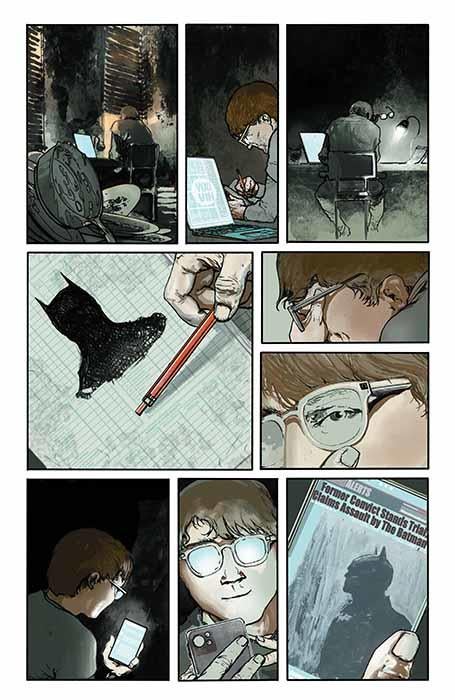
And I was like, "Yeah, I think it could be." I kind of thought that in my head, but I don't think I would've proffered it on my own. And then, I think, literally the next day he was like, "I emailed, or called Jim Lee and you guys should talk to DC." And I was like, "Okay." And then I did, and they liked the idea and the backstory I had. And then it was one of those really good like, oh, shit, now I actually have to do this. But also really excited and this is really cool. And then I started. It's turned to its own thing now. So, the genesis of it is the backstory that I worked with as an actor, but it needs to also be a story that stands on its own two legs for a comic reader, and not just in service of the film. So, it needs to do both. So now it's really just turned into, it's taken its own life.
And it's kind of got this in two worlds kind of piece of it. You've got the fans of the movie, you've got the fans of comic, you've got the fans of both. They're hand shaking with this in a sense, it's in its own existence. Something that's kind of interesting, because of this, you've helped craft the origin while you were creating the present day story in a sense. And then the movie gives us that tease at the end where, because he's kind of got this open future, and I mean, spoiler if you haven't seen the movie, he doesn't die. So, we get this possibility of a future, and he has that moment with the Joker at the end. As you're kind of working in all of this world, would you want the opportunity or have you been thinking of opportunities to take the Riddler's future places, since obviously, you're very invested in this character, and you've had this moment with another iconic villain. Is there a pathway to a future now that you are so invested?
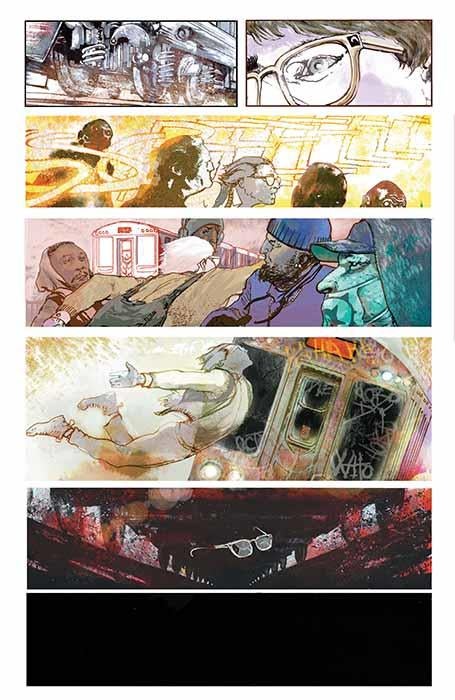
Well, if they wanted there to be one, I'd probably be there. But I actually have not thought a whole lot about it, and I find it curious myself that I've somehow spent even more time with this character, because somebody asked me, when we were doing Batman press, "Did you take anything home from the set?" And I was like, "No." Of Edwards. I was like, I don't need anything of that guy in my home. Jokingly. And then here I am and I have spent, on and off, a year or two writing this comic. And that was really, it felt right for the medium of comics, because it's a really good way to explore internal monologue. Where film, I think, voiceover only holds to a certain degree. And this kind of offers the chance to get into what a person like that, that sort of obsessive thinking, almost like a inner monologue that picks up throughout the comic, I should say as well. And so not a lot of my attention has gone towards his future. Maybe it will someday.
And that kind of brings me back around to Riddler: Year One. You mentioned that internal dialogue. And again, in The Batman we see the brutal outcomes of where this story takes us, even though it is very much a comic story as well. The book humanizes Edward in a way, but it also doesn't flinch away from how toxic his worldview really is. How do you balance the reality that the world is very unfair to this character, and a character like Edward, because there are many Edwards in this world and in the fictional world, while also still showing that his worldview is toxic and has toxic outcomes?
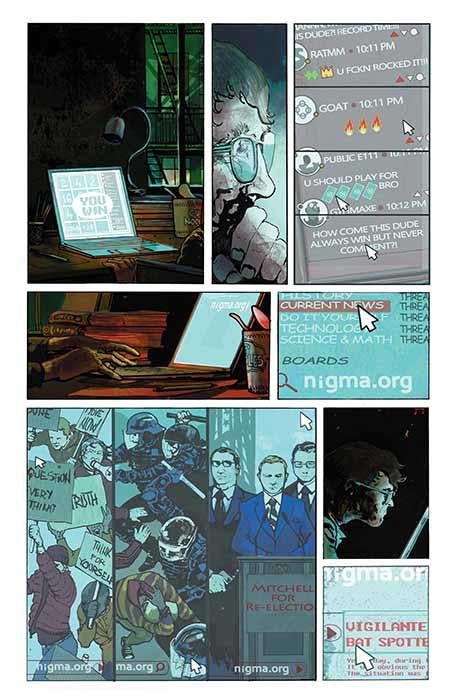
That's a really good question, and it's something I've thought about because it's different to be inside of the character. I have to empathize. I have to find some doorway in to the person as an actor. But now as a storyteller, telling the comic and having to step out of it as well, one has to think about what's it saying and blah blah, blah. And because we know where he goes to a certain degree, there's no happy ending here. That's not a spoiler. So my hope is that it's almost like a cautionary tale, if anything.
Yes. I think that one thing that the first conversation Matt Reeves and I ever had were about the two sides of trauma, and Bruce Wayne and how he uses his trauma. And then Edward, unfortunately, uses his trauma in another way. So I've always seen this comic as an emotional horror story about trauma. And there's both nature and nurture at work. I mean, I don't think you necessarily get to the point that Edward gets to without your nature having some disposition that might, but it doesn't happen necessarily without nurture as well.
Now it's different in real life, and every person's different and blah blah, blah. I mean for this guy it was important that nurture also played a role because we were talking about Gotham, and how this was a sick city and it was failing. And so I'll be curious how you think about that element because it continues to evolve. Issue one, I would say, is the most empathetic, but also I think you see his sort of toxic negative thinking as well, and his intrusive thoughts. So I hope it's clear that this is also somebody who's struggling. I mean maybe also... Yeah.
No, I get what you mean. You really do see that this is a person who is, for lack of a better term, and I hate this term, I come from a social work background and I hate the term damaged, but there is some emotional damage in there. In his nature there is definitely some problematic issues going on. But you also see, at least at this very beginning, almost this desire to not fit in, but to find a way to coexist in the world in a way that doesn't hurt. You see him not necessarily wanting to be bad. But you also kind of see where that might start going off the rails because of outside input, and it kind of asks larger questions of what is the role of interventions, and how does a sick city play, and what does environment do to somebody who's already predisposed to having these issues.
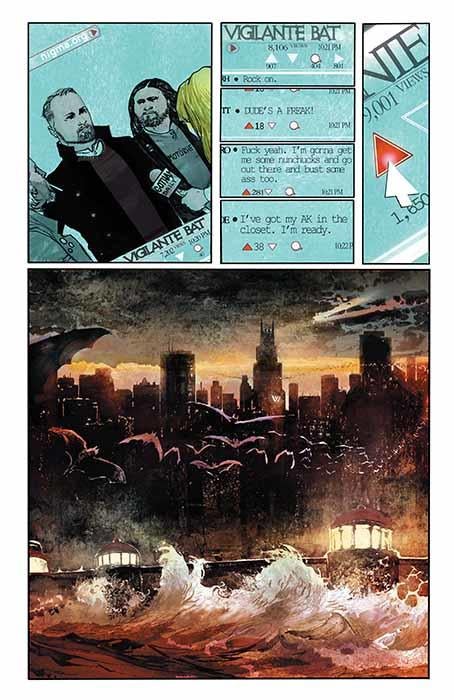
So you're right, it's interesting to see where you kind of get set up for this hopefulness, but there's also that undercurrent of, you know this isn't going to go well and what's the larger story. So you absolutely do see that. Something you said about, because again, interesting perspective. You've been inside the character as the actor and now you're outside the character as a storyteller. How did knowing the inside both make writing the outside piece perhaps easier, or did it present any additional challenges for you as the writer crafting things?
I would say maybe at first harder actually, or more challenging because of popping back out to some kind of bird's eye view as a storyteller, and even thinking about the reader or the audience. So I already had a path in. And I think it's been really fun. I've learned a ton. I mean, I'm happiest when I'm learning, when I'm working. It just keeps me excited. And I've really learned a lot doing this comic. So it's been really fun to get stuck and go, oh wait, I have to step out here, or let me get some feedback for my artist or editor. And now I do think the comic continues to, it's purposely a very subjective experience. It's what I have to offer as a psychological emotional point of view for this guy. So we, literally in page one, start in his head, and he opens his eyes, but it does continue to grow as the issues come. So the first one is the most reflective of me where I started as an actor almost. And then it, I think, grows as a storyteller in the next couple.
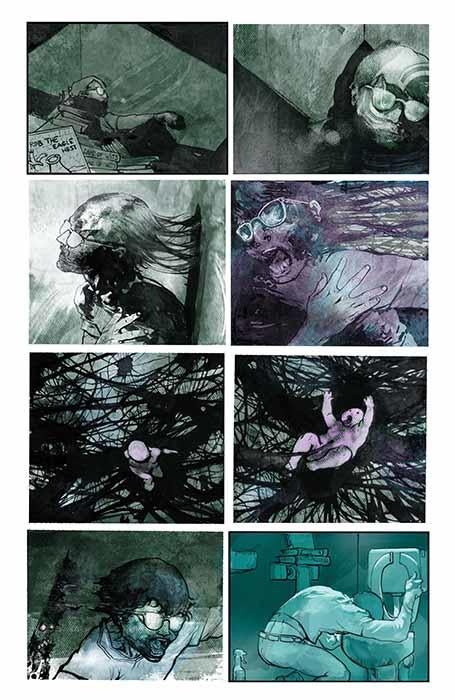
Were you a big fan of comics before diving into both the character and then also writing a comic?
I was. I mean, I was a fan of comics as a kid. And then in my adult life I'd read some of the great graphic novels. I wouldn't say I was a comic nerd or anything. I am now. When I had to prep for The Batman, I read a ton of Batman comics. Not just thriller ones, really just to soak up Gotham, the history, the sort of archetypal energy that's in all these comics. And I just loved them. It was like a door opened and I was like, oh, I haven't been in this awesome room in a while. And I just was so surprised how much I loved doing The Batman as a whole. Including the comics.
And I dorked out about comics pretty quick before I knew I was going to write the comic. Even reading books about comics, I just got super into it, and I read Scot McGlasson, and Grant Morrison, Supergods, and this was all before writing the comic. It was just, once I went down the Batman rabbit hole, I was suddenly just really engaged with the medium again. So yeah, it's been really, I mean, I feel really lucky, too, that I get to take a crack at this, and that they let me. It's a very involved process. My artists and I have a super intense collaboration and we've put a lot into this. So it really feels like it's a full meal.
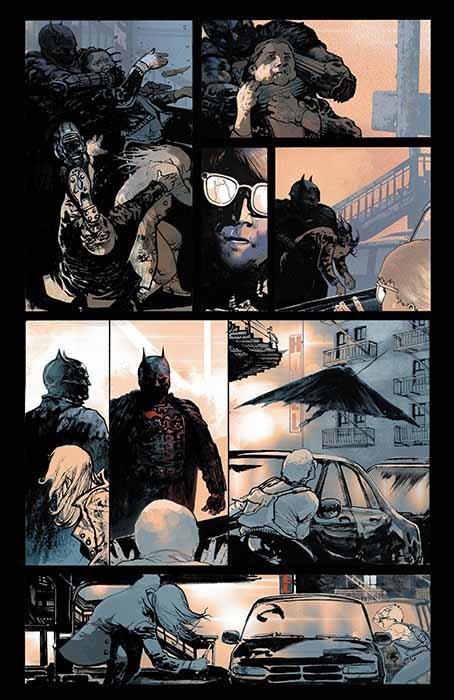
And I was actually wondering about, the art in this book is really fantastic. And you'd mentioned that when you were working as your, I'm going to call it your character journal, building your character when playing the film, you kind of saw it in pictures. Obviously, tells me a little bit, maybe you're a visual thinker, I am too. But it's a little different from being a visual thinker to actually being a visual creator. What was it like building a story with an actual artist who's bringing it to life? What was that collaboration like?
Great. Stevan Subic is his name. He has not done a comic here in the US I don't think, which I'm so excited for people to see his work. I looked at a lot of people, and Stevan had some art that I was like, man, this guy's good, but I don't think it's right for this. And then I luckily ended up asking for more samples of his, I was like, maybe. And then he had this drawing of The Batman that was just on his Instagram or Twitter or something. I was like, that's it. That's what Edward would want on his wall to look up at. And then I got some, I think some Italian horror comic he did, and I was like, okay, this guy, he's got something. And so we work pretty closely together. I have no clue how other writer artists collaborations work in comics except from interviews I've read and podcasts I've listened to. But I would say we work pretty closely together.
I write in treatment form first. Comic script for me, it just doesn't look, I'm not used to it, so it doesn't read emotionally, it requires my brain. So I write in treatment form. And then Stevan and I get on Zoom and he does crude panel layouts. And that's the part where we're most involved together, where I'm like, here's what I see in my head, boom, boom, boom. And then often he'll come up with something better for the medium and I'm like, okay, yeah, that's great. And then he'll keep working on layouts. And then we talk a lot. So it's been very much a partnership I would say, and I love working with him and I'm really impressed by his work. And I'm excited for the subsequent issues because he gets to let loose even a little more as the character goes through some stuff. So yeah.
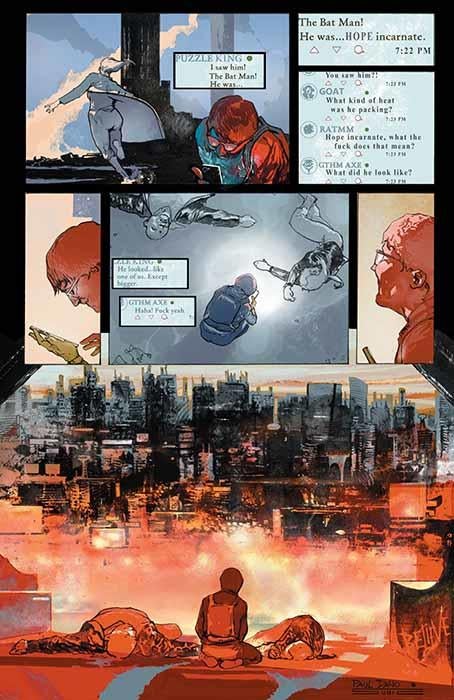
Goes through some stuff. Sounds so ominous and so exciting at the same time. Was there anything about writing the story that surprised you, either in terms of the process of doing it, which is obviously different than acting, though I imagine there're some similarities, or in developing the character?
Yeah. Well, it's been hard, and there's been enough days where I bang my head against the wall, but it's been really fun. And there's something that's shifted in me just by working on it because you're kind of gifted some freedom when you step into a medium that is new to you. There's that beginner's mind thing. And that's been really nice to just be in a place where you're asking questions again. And I think it often leads to something good, because I don't have as many preconceived notions about, as I might acting or something. And I think probably, while character and detail, I think the idea of plot, having to hold something together as well is different for my brain. And so that's been really interesting, especially kind of issues two and three pick up their pace a bit in terms of getting them to a certain point. And that's been really fun to engage a bit more with fun plot stuff.
What is it that you feel you're most excited for readers to experience with Riddler: Year One?
Well, Stevan's art. And I don't know. I mean, I hope that they enjoy reading it. I hope from page one to page 32 that there's a pull, some kind of psychic pull of his world or head space. And I hope that it's its own thing enough. And yeah, honestly, I'm really curious to see what people think. I'm excited to share it.
Absolutely. I know for myself as a fan of The Batman, and also just a fan of comics in general, you're Riddler, in the movie, unsettled me in a lot of ways. And I think that's, I mean, that's a compliment. That means you did a good job, because that's an unsettling character. And I was just so fascinated going into this book that I never expected to really want to know more. I like villains, I'm not always a, I want to know more about the villain, but I was very fascinated from the jump to get into his head and try to understand what makes him tick, and all of that. So I do think that's really interesting.
One of the things I think that is definitely going to happen as people dive into this story, partially because The Batman was so popular, also because this book really does give you this rich, both nuanced and also not nuanced at the same time, sense of things. Since we kind of have an idea of where this character ultimately ends up, and knowing that there's going to be more of The Batman to come. People are going to have questions knowing that the character survives that movie. Do you think we could ever see the character, or you, appear in The Batman 2, and having explored his origin like this, would impact how you play the character in live action? Again, should you have the opportunity? Or would you want to?
Yeah. So the essence of the comic does come from the work I did to give the performance. So I think yes and no. I'm sure that I'm deeper into this than ever because of writing this comic. But the essence, the emotional essence of it is something I'd worked with already. And the comic has grown into its own thing, but the essence comes from the work I did going into the film. And I have no clue if I will play the Riddler in live action again or not. But like I said, I loved making The Batman, so I think I certainly would.
0comments